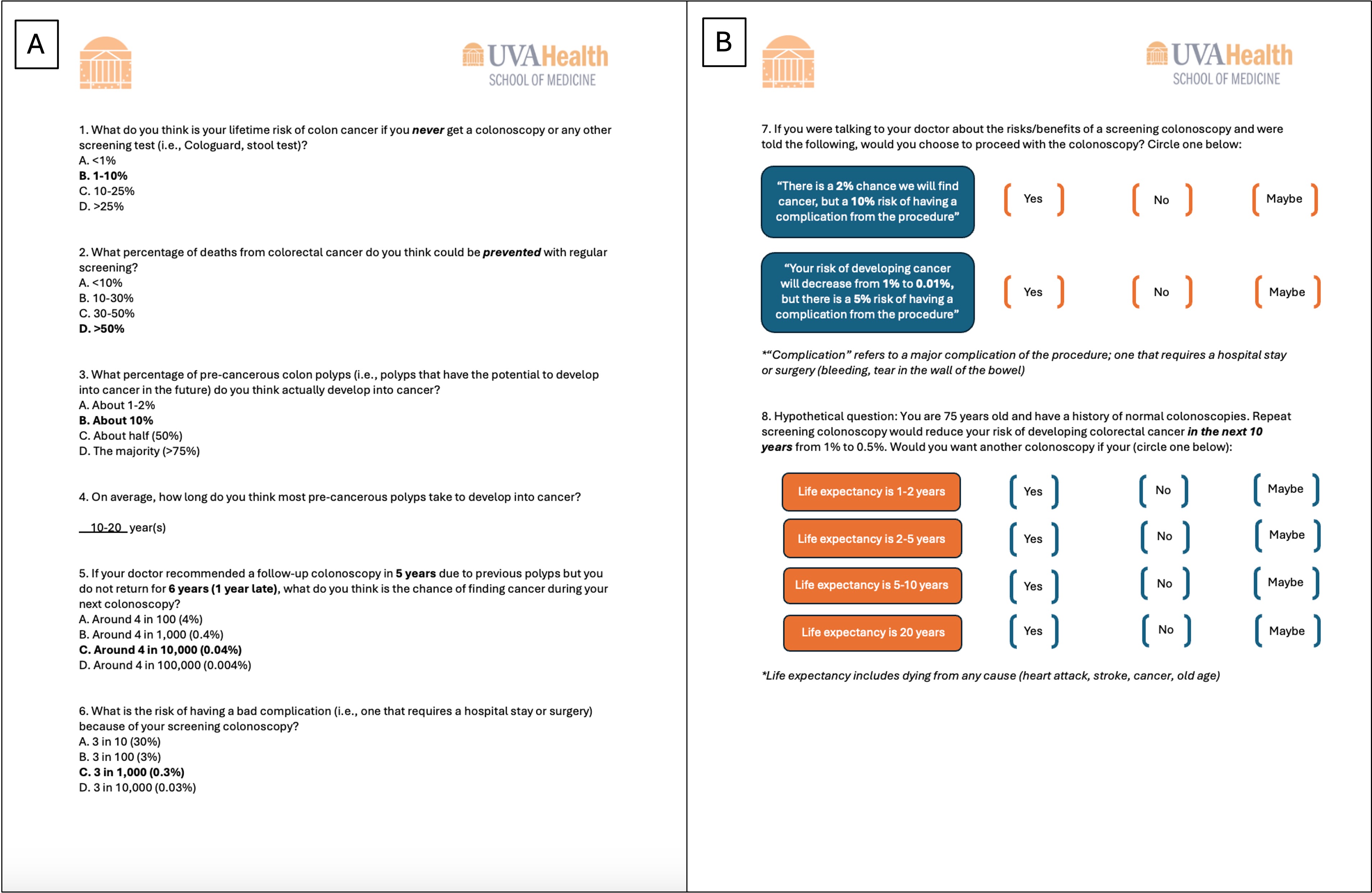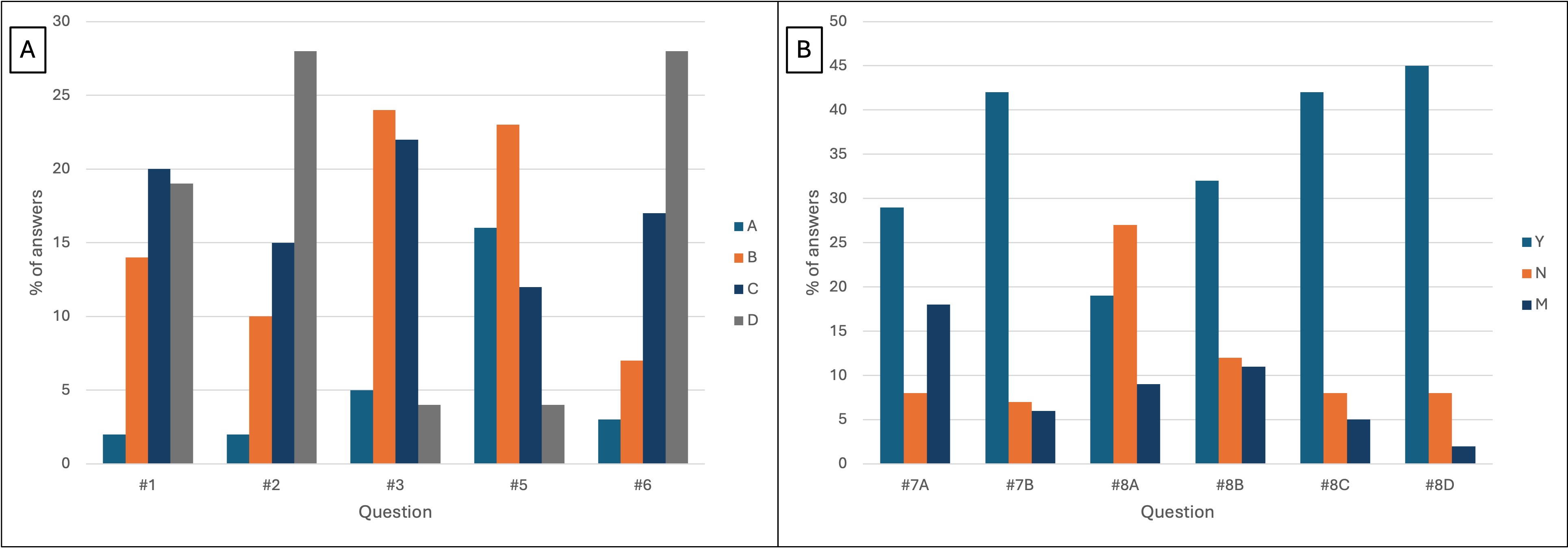Monday Poster Session
Category: Colorectal Cancer Prevention
P2639 - Patient Perceptions (and Misperceptions) of Colon Cancer Screening
Monday, October 27, 2025
10:30 AM - 4:00 PM PDT
Location: Exhibit Hall
- LL
Laura Lavette, MD (she/her/hers)
University of Virginia Medical Center
Charlottesville, VA
Presenting Author(s)
Laura Lavette, MD1, Gianna Stoleru, MD2, Andrew Copland, MD1
1University of Virginia Medical Center, Charlottesville, VA; 2University of Virginia, Charlottesville, VA
Introduction: In the United States, colorectal cancer (CRC) remains the second most common cause of death related to cancer. Routine screening is recommended for early detection and can be achieved through fecal testing or colonoscopy (CSY). Adherence to CRC screening is dependent on patients’ perceptions of the benefits and effectiveness of screening methods. We conducted a survey study to gain a better understanding of patients’ 1) baseline knowledge, 2) opinions, and 3) risk tolerance surrounding screening CSYs.
Methods: This single center, prospective survey study included eight questions inquiring about lifetime risk of CRC, risks and benefits of CSY, and risk tolerance for screening CSY. We included adult patients undergoing screening or diagnostic CSYs. Patients were invited to participate in the study while in the pre-operative waiting area prior to their procedure.
Results: Fifty-five patients were included in the final analysis. Demographics included median age of 55, 47% male patients, and 5% of patients >75 years old. 73% of patients were undergoing screening CSY with the majority (88%) identified as average risk. 25% of patients correctly recognized the lifetime risk of CRC as 1-10% while the majority (71%) felt it was higher. Over half of patients (51%) knew that >50% of CRC could be prevented with regular screening. 69% of patients thought that polyps take 5 or less years to develop into cancer (median=5 years). 82% of patients recognized the risk of adverse outcomes with screening CSY is quite low (< 1%). 35% of patients would elect to undergo screening CSY at age 75 if their life expectancy was as low as 1-2 years; most patients (76%) would desire CSY if their life expectancy was closer to 5-10 years.
Discussion: In summary, most patients assumed substantial CRC risk reduction with regular screening; however, they overestimated the lifetime risk of CRC as well as the speed of polyp progression. Interestingly, many patients would opt to undergo screening CSY at age 75 knowing there is a small (0.05%) chance of reducing their risk for developing CRC over the next 10 years. Our results highlight opportunities for improved education in the CRC screening process; specifically, when patients near age 75 and may have limited benefit from continued surveillance. Limitations include selection bias and modest sample size. Future work will focus on expanding and diversifying the patient cohort to better inform our clinical and educational practice.

Figure: (A) Front and (B) back of survey study with answers in bold.

Figure: (A) Breakdown of answers A-D to questions 1, 2, 3, 5, and 6 and (B) breakdown of answers yes/no/maybe to questions 7 and 8.
Disclosures:
Laura Lavette indicated no relevant financial relationships.
Gianna Stoleru indicated no relevant financial relationships.
Andrew Copland indicated no relevant financial relationships.
Laura Lavette, MD1, Gianna Stoleru, MD2, Andrew Copland, MD1. P2639 - Patient Perceptions (and Misperceptions) of Colon Cancer Screening, ACG 2025 Annual Scientific Meeting Abstracts. Phoenix, AZ: American College of Gastroenterology.
1University of Virginia Medical Center, Charlottesville, VA; 2University of Virginia, Charlottesville, VA
Introduction: In the United States, colorectal cancer (CRC) remains the second most common cause of death related to cancer. Routine screening is recommended for early detection and can be achieved through fecal testing or colonoscopy (CSY). Adherence to CRC screening is dependent on patients’ perceptions of the benefits and effectiveness of screening methods. We conducted a survey study to gain a better understanding of patients’ 1) baseline knowledge, 2) opinions, and 3) risk tolerance surrounding screening CSYs.
Methods: This single center, prospective survey study included eight questions inquiring about lifetime risk of CRC, risks and benefits of CSY, and risk tolerance for screening CSY. We included adult patients undergoing screening or diagnostic CSYs. Patients were invited to participate in the study while in the pre-operative waiting area prior to their procedure.
Results: Fifty-five patients were included in the final analysis. Demographics included median age of 55, 47% male patients, and 5% of patients >75 years old. 73% of patients were undergoing screening CSY with the majority (88%) identified as average risk. 25% of patients correctly recognized the lifetime risk of CRC as 1-10% while the majority (71%) felt it was higher. Over half of patients (51%) knew that >50% of CRC could be prevented with regular screening. 69% of patients thought that polyps take 5 or less years to develop into cancer (median=5 years). 82% of patients recognized the risk of adverse outcomes with screening CSY is quite low (< 1%). 35% of patients would elect to undergo screening CSY at age 75 if their life expectancy was as low as 1-2 years; most patients (76%) would desire CSY if their life expectancy was closer to 5-10 years.
Discussion: In summary, most patients assumed substantial CRC risk reduction with regular screening; however, they overestimated the lifetime risk of CRC as well as the speed of polyp progression. Interestingly, many patients would opt to undergo screening CSY at age 75 knowing there is a small (0.05%) chance of reducing their risk for developing CRC over the next 10 years. Our results highlight opportunities for improved education in the CRC screening process; specifically, when patients near age 75 and may have limited benefit from continued surveillance. Limitations include selection bias and modest sample size. Future work will focus on expanding and diversifying the patient cohort to better inform our clinical and educational practice.

Figure: (A) Front and (B) back of survey study with answers in bold.

Figure: (A) Breakdown of answers A-D to questions 1, 2, 3, 5, and 6 and (B) breakdown of answers yes/no/maybe to questions 7 and 8.
Disclosures:
Laura Lavette indicated no relevant financial relationships.
Gianna Stoleru indicated no relevant financial relationships.
Andrew Copland indicated no relevant financial relationships.
Laura Lavette, MD1, Gianna Stoleru, MD2, Andrew Copland, MD1. P2639 - Patient Perceptions (and Misperceptions) of Colon Cancer Screening, ACG 2025 Annual Scientific Meeting Abstracts. Phoenix, AZ: American College of Gastroenterology.
